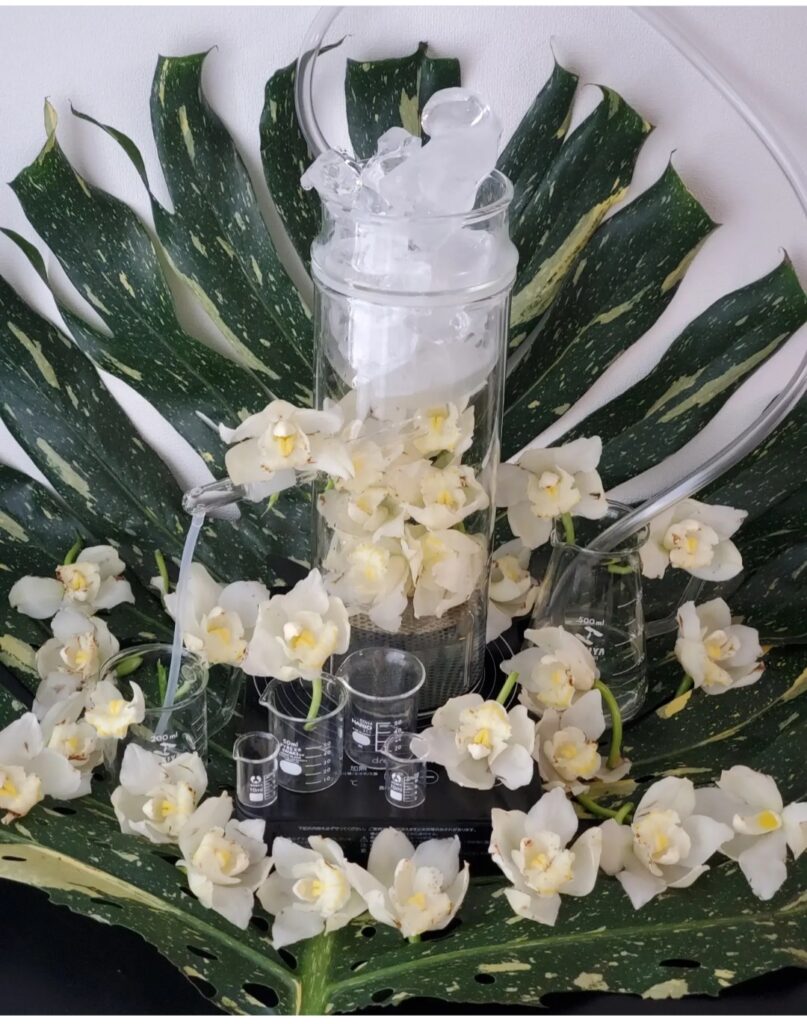アロマテラピー
aromatherapy
アロマというと、いい香りで、リラックスするイメージがあります。リラックスと自律神経は、密接な関係があります。自律神経は人間が生きていくために必要な生命の機能をコントロールして、交感神経と副交感神経の二つから成り立っています。交感神経は主に昼間活発になる神経で、交感神経が活発になると、血管が収縮し、血圧が上がり、瞳孔が拡大します。要約すると、戦う神経、心と体が興奮している状態です。一方、副交感神経は主に睡眠時、休んでいるときに活発になる神経です。副交感神経が活発になると、血管が拡張し、血圧が下がり、瞳孔が縮小します。心と体がリラックスしている状態です。自律神経は呼吸、脈拍、体温、血圧、心拍、意識、血液循環、消化吸収などを24時間コントロールしています。自分の意志とは関係なく働き続けています。しかし、自律神経のバランスが乱れてしまうと心と体に、様々な影響がでてきます。自律神経が乱れると、不安や緊張が強くなり、全身のだるさ、不眠などの症状があらわれます。また、胃痛や胸やけ、便秘や下痢、頭痛、肩こりなどの身体症状もあらわれます。原因は、過度のストレスや寝不足、不規則な生活、偏った食生活などがあります。交感神経が活発になる状態が続いていることが、原因の一つともいわれています。そこで、副交感神経に働きかけ、自律神経を整える必要があります。アロマテラピーは、アロマ(芳香)とテラピー(療法)を合わせた造語です。アロマテラピーは植物、果実から採取して作られた、精油・オイルやフローラルウォーターを使用した自然療法です。アロマは心と体の全身に作用する療法といわれています。体の不調と心の疲れ、ストレスを一緒に癒すことができると言われています。アロマには自律神経を整える効果があるのは、香りと脳には、深い関係があるからです。アロマの香りを嗅ぐと、香りの成分は鼻の奥にある嗅上皮に付着します。嗅上皮に付着した香り成分は、嗅細胞で電気信号へと変換され、嗅神経を通って大脳辺縁系へと伝わっていくのです。大脳辺縁系は食欲・記憶・感情など本能に深く関わる部位です。また、大脳辺縁系へ伝わった香りの電気信号は視床下部へと伝わります。視床下部は自律神経やホルモン分泌、免疫の働きを調整している場所です。人間の五感の中で、大脳辺縁系に直接、働きかけるのは嗅覚だけです。香りを嗅いで、誰かを思い出したり、昔の感情を思い出すのも大脳辺縁系が記憶を司るからです。視覚や聴覚の場合は、まず大脳新皮質へ伝わります。大脳新皮質は、思考や言語を司る場所です。そのため、理性が先に働き、その後大脳辺縁系へと伝わります。嗅覚の場合、いい香りという感情が働き、次に何の香りかを認識します。頭で考えるよりも、先に心や体に働きかけ、体を良い状態へ調整していきます。アロマの香りは、呼吸、皮膚からも取り込まれ心や体に作用します。呼吸から肺へ取り込まれた香りの成分は、血流にのって全身をめぐります。マッサージなどで皮膚へ塗っても、皮膚から成分が吸収され全身へと運ばれます。皮膚に浸透した香り成分は毛細血管やリンパ管に入り込みます。そして、血液、リンパ液の流れにのって全身へ運ばれます。アロマは、鼻・肺・皮膚から全身を素早くめぐります。そのため症状にもよりますが、素早く効果を発揮するのも魅力のひとつです。治療院では、花店のお花を蒸留して、オイルやフローラルウォーターを作り、治療に用いています。蒸留するお花は、日ごとに変わりますが、患者さまの症状に合わせたアロマテラピーを、ぜひ体験してみてください。
When we think of aroma, we have an image of nice fragrance and relaxation. Relaxation and the autonomic nervous system are closely related. The autonomic nervous system controls vital functions necessary for human life and is composed of sympathetic and parasympathetic nerves. The sympathetic nervous system is primarily active during the daytime; when the sympathetic nervous system is active, blood vessels constrict, blood pressure increases, and the pupils dilate. In summary, it is the nerve that fights, the state in which the mind and body are excited. On the other hand, the parasympathetic nervous system is active mainly during sleep and rest. When the parasympathetic nervous system is active, blood vessels dilate, blood pressure decreases, and the pupils contract. The mind and body are relaxed. The autonomic nervous system controls breathing, pulse, body temperature, blood pressure, heart rate, consciousness, blood circulation, digestion and absorption 24 hours a day. It continues to work regardless of one's will. However, if the balance of the autonomic nervous system is disturbed, the mind and body are affected in various ways. When the autonomic nervous system is disturbed, anxiety and tension become stronger, and symptoms such as general lethargy and insomnia appear. Physical symptoms such as stomach pain, heartburn, constipation, diarrhea, headache, and stiff shoulders may also occur. Causes include excessive stress, lack of sleep, irregular lifestyle, and unbalanced diet. It is said that one of the causes is that the sympathetic nervous system remains active. Therefore, it is necessary to work on the parasympathetic nervous system to regulate the autonomic nervous system. Aromatherapy is a coined word that combines the words "aroma" and "therapy. Aromatherapy is a natural therapy using essential oils, oils and floral waters extracted from plants and fruits. Aromatherapy is said to be a therapy that affects the whole body and mind. It is said to be able to heal physical discomfort, mental fatigue, and stress together. Aroma has the effect of regulating the autonomic nervous system because there is a deep relationship between aroma and the brain. When you smell an aroma, the components of the aroma adhere to the olfactory epithelium, which is located at the back of the nose. The aroma components adhering to the olfactory epithelium are converted into electrical signals by the olfactory cells, which are then transmitted to the limbic system through the olfactory nerve. The limbic system is deeply involved in instincts such as appetite, memory, and emotion. The electrical signals of aroma transmitted to the limbic system are transmitted to the hypothalamus. The hypothalamus regulates the autonomic nervous system, hormone secretion, and immune system. Among the five human senses, only the sense of smell acts directly on the limbic system. Smelling a fragrance reminds us of someone or reminds us of old feelings because the limbic system is responsible for memory. In the case of sight and hearing, the information is first transmitted to the neocortex. The neocortex is where thinking and language take place. Therefore, reason acts first, and then it is transmitted to the limbic system. In the case of the sense of smell, the emotion of a good smell comes first, followed by recognition of what the smell is. It works on the mind and body first and adjusts the body to a better state, rather than thinking about it in the head. Aromatic scents are taken in through the breath and the skin, and they act on the mind and body. The components of aroma taken into the lungs through the breath are carried throughout the body in the bloodstream. When applied to the skin for massage, the ingredients are absorbed through the skin and transported throughout the body. Fragrance components that permeate the skin enter the capillaries and lymph vessels. They are then carried throughout the body in the blood and lymphatic fluid. Aroma travels quickly throughout the body through the nose, lungs, and skin. Therefore, depending on the symptoms, one of the attractions of aroma therapy is its quick effect. At the treatment center, flowers from the flower store are distilled to make oil and floral water for use in treatment. The flowers we distill change daily, but we invite you to experience aromatherapy tailored to your patient's symptoms.

#aroma #aromatherapy #aromaterapia #aromatherapie #aromatheraphy #aromamassage #aromatic #aromas # アロマ #アロマテラピー #アロマトリートメント
#アロママッサージ #アロマオイル #athlete #antiaging #アンチエイジング


